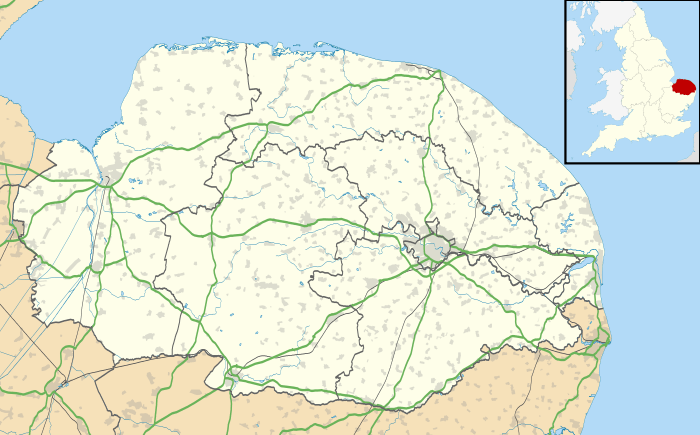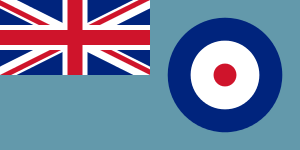RAF Neatishead
| RRH Neatishead | |
|---|---|
| Near Norwich, Norfolk in England | |
|
Caelum Tuemur Latin: "We Watch over the Sky" | |
 RRH Neatishead Shown within Norfolk | |
| Coordinates | 52°42′51″N 001°28′15″E / 52.71417°N 1.47083°ECoordinates: 52°42′51″N 001°28′15″E / 52.71417°N 1.47083°E |
| Type |
formerly: Sector Operations Centre, then: Control and Reporting Centre, now: Remote Radar Head |
| Site information | |
| Owner | Ministry of Defence |
| Operator | Royal Air Force |
| Condition | Intact |
| Site history | |
| Built | 1941 |
| In use | 1941-Present |
| Battles/wars | Second World War, Cold War |
| Garrison information | |
| Current commander | Squadron Leader Nick Olliver |
RRH Neatishead (/ˈnitɪshɛd/ NEET-is-hed)[1] is a Royal Air Force Remote Radar Head in the English county of Norfolk, East Anglia established during the Second World War. It consists of the main technical site, and a number of remote, and sometimes unmanned sites.
The station motto is Caelum Tuemur, meaning "We Watch over the Sky". The station crest depicts the lowered head of a horned bull; and relates to the origins of the word "Neatishead", deriving from old Anglo Saxon language "Nethes Herda", meaning the "abode of the keeper of cattle". It is a co-incidence that Neatishead is near the village of Horning.
The primary function of Neatishead was as a "Control and Reporting Centre" (CRC) for the south of the United Kingdom; it forms a part of the UK's air defences - namely the UK "Air Surveillance And Control System" (ASACS), and is part of the larger NATO air defence. It uses radar, ground-to-air radio and digitally encrypted data links.
Equipment previously located in the base included: Type 7 Radar, FPS 6 height finding radar, Type 80 "Green Garlic" radar, Type 84 radar, Type 85 "Blue Yeoman" radar and a R15 Radar.
On 16 February 1966 a fire broke out in the bunker, station fire teams were unsuccessful in putting the fire out and so civilian fire crews were called. 3 civilian firefighters lost their lives. Later that year LAC Cheeseman was sentenced to 7 years for starting the fire and causing the deaths.[2]
RRH Neatishead controls the remote site of RAF Trimingham with its Lockheed TPS 77 Radar.
Neatishead is adjacent to the RAF Air Defence Radar Museum.
In April 2004 the decision was taken to substantially reduce activities at Neatishead, and by 2006, the base had been downgraded to Remote Radar Head (RRH) status, but the museum remains open. The gate guardian, a Phantom previously based at RAF Wattisham, was cut up for scrap in 2005 despite interest from the Radar Museum.[3]
In October 2006 local media reported that a buyer had been found for the now disused section of the base.[4] The 25 1/2 acres site was advertised again in January 2010, with an asking price of £4,000,000.[5] In February 2013, the site appeared on eBay[6] with a guide price of £2,500,000.
See also
References
- ↑ G.M. Miller, BBC Pronouncing Dictionary of British Names (London: Oxford University Press, 1971), p. 108: "[NEET-stəd] is the traditional village pronunciation. [NEET-is-hed] is used by Service personnel for the local R.A.F. Station."
- ↑ Hansard report Retrieved 19 February 2011
- ↑ Site Name: Wattisham Mk. 2 Bloodhound Missile Site, Subterranea Britannica, 10 August 2006, retrieved 18 January 2010
- ↑ Buyer found for RAF Neatishead site, Eastern Daily Press, 21 October 2006, retrieved 18 January 2010
- ↑ RAF Neatishead (PDF), Barlow Associates, January 2010, retrieved 18 January 2010
- ↑ RAF Airbase Up For Sale On Ebay, Gizmodo, February 2013, retrieved 1 February 2013
External links
- RAF Neatishead official website
- Read a detailed historical record about RAF Neatishead
- RAF Air Defence Radar Museum

